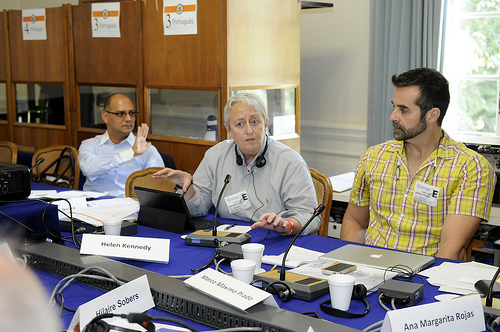Washington, D.C. – The Inter-American Commission on Human Rights (IACHR) held a regional meeting of independent experts on education and culture as they relate to the rights of lesbian, gay, trans, bisexual, and intersex (LGTBI) persons in the Americas. The meeting took place September 12-13 at the IACHR headquarters in Washington, D.C., and was organized by the IACHR Unit on the Rights of LGTBI Persons. The meeting was conducted by the Rapporteur on the Rights of the Child, Commissioner Rosa María Ortiz.
 Date: September 12, 2013
Date: September 12, 2013
Place: Washington, DC
Credit: Juan Manuel Herrera/OAS
The participants presented technical and testimonial information on key achievements, obstacles, and pending tasks, as well as progress and best practices related to education, culture, and the rights of LGTBI persons in the region. The results of the meeting will be used as input in the preparation of a regional report on the human rights situation of LGTBI persons.
More than 15 experts of different nationalities attended the meeting, which included discussion and debate on issues such as education in human rights and gender; bullying at school based on real or perceived sexual orientation and/or on gender identity or gender expression; the right to comprehensive sex education; access to education for trans persons and strategies for raising awareness of key players in the field of education; and the influence of the media, marketing techniques, religious groups, and cultural patterns of discrimination, segregation, and prejudice against LGTBI persons. Participants also analyzed the relationship between discrimination and violence directed against LGTBI persons and heteronormativity, gender binarism, and misogyny. Furthermore, the situation of violence against children and adolescents in the educational setting, its causes and consequences, was widely debated.
The Rapporteur on the Rights of the Child, Commissioner Rosa María Ortiz, underscored the role of education as a strategic tool that makes it possible to combat and eliminate prejudice, stereotypes, and false conceptions with regard to people with diverse sexual orientations or gender identities. She also stressed the need to move toward full recognition of the rights of LGTBI persons, emphasizing the need to depathologize diverse forms of sexuality and identity.
Violence and Killings of LGTBI Persons Continue in the Region
Violence against LGTBI persons was also a focal point of the meeting. In particular, the IACHR notes that the participants reported during the meeting that between the night of September 12th and the morning of Friday September 13th two trans women had been killed in Brazil and El Salvador.
The Commission recalls that it is the State’s obligation to take steps to respond to these human rights violations and ensure that LGTBI persons can effectively enjoy their right to a life free from discrimination and violence, including the adoption of policies and public campaigns. The ineffectiveness of a State’s response to violence fosters impunity, which in turn leads to the chronic repetition of such crimes. Impunity for these types of crimes also sends a general message to society that such violence is tolerated.
A principal, autonomous body of the Organization of American States (OAS), the IACHR derives its mandate from the OAS Charter and the American Convention on Human Rights. The Inter-American Commission has a mandate to promote respect for human rights in the region and acts as a consultative body to the OAS in this matter. The Commission is composed of seven independent members who are elected in an individual capacity by the OAS General Assembly and who do not represent their countries of origin or residence.